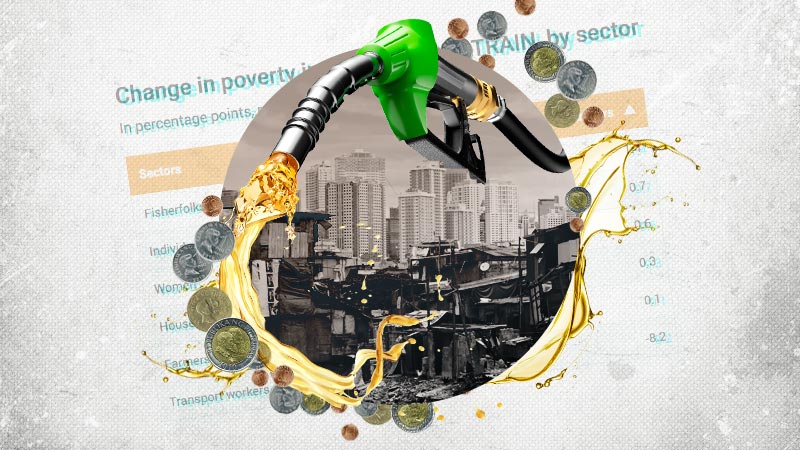SUMMARY
This is AI generated summarization, which may have errors. For context, always refer to the full article.
![[ANALYSIS] New year, new fuel taxes: Do we really need them?](https://www.rappler.com/tachyon/r3-assets/612F469A6EA84F6BAE882D2B94A4B421/img/AA010787E418447F96DE92C2933F8D3E/new-year-new-fuel-taxes--do-we-really-need-them-jan-3-2019.jpg)


What better way to greet 2019 than paying even higher taxes?
Effective January 1, President Duterte’s TRAIN Law (Tax Reform for Acceleration and Inclusion) imposed its second round of tax hikes on petroleum products like gasoline and diesel.
You might recall these tax hikes almost didn’t happen. Amid record high inflation last year, a number of lawmakers (mostly reelectionists in May) beseeched President Duterte to suspend them.
Duterte’s economic team almost yielded until world oil prices started to drop starting October. This new development, to them, would make the tax hikes more palatable.
In addition, they like to say these tax hikes will be crucial to fund the Duterte government’s major economic projects – notably Build, Build, Build. They’re anti-rich and pro-environment to boot.
But are these claims true? In this article we review the rationale for TRAIN’s fuel taxes, and note that they’re less beneficial than they’re cracked up to be.
Not enough revenues
For one thing, TRAIN’s fuel taxes have not raised enough revenues.
Recall that TRAIN was touted in 2017 as the “best Christmas and New Year’s gift” of the Duterte administration because it lowered the share of your income that goes to the government as taxes.
However, this tax cut meant colossal government revenue losses which must be replaced one way or another. Otherwise, the Duterte government’s ambitious projects – notably the P8-trillion Build, Build, Build – will not take off.
Thus, you could say that TRAIN had no choice but to impose new or higher taxes on select products. They chose petroleum, automobiles, sugar-sweetened beverages, cigarettes, coal and coke, and other minerals.
To soften the blow, the petroleum tax hikes were distributed across 3 rounds from 2018 to 2020, set to apply every January 1st (see Table 1).
Table 1
But it appears TRAIN didn’t generate enough revenues as expected.
Dr Chat Manasan of PIDS, in a recent analysis, estimated that TRAIN will likely result in tax revenue losses (rather than gains) to the tune of P66 billion in 2018, and losses of P33 billion in 2019. Only in 2020 onwards will it generate positive extra revenues.
Reports also indicate that from January to August 2018 the Department of Finance (DOF) was expecting to collect P41.8 billion in revenues from TRAIN’s petroleum excise taxes, but collected only P31 billion (a 26% shortfall).
More generally, TRAIN’s excise tax collections – including the other products – experienced a 17% shortfall over the same period.
Role in inflation
TRAIN is also stoking inflation even as it’s missing its revenue targets.
Remember that TRAIN’s fuel taxes were approved just when world oil prices started to rise in late 2017. So when oil prices skyrocketed in 2018, TRAIN’s proponents drew flak for passing such an ill-timed law.
However, world oil prices have plummeted since October 2018. This gave Duterte’s economic team an excuse to push through with the second round on January 1, 2019. After all, what is an extra P2 per liter tax when retail gas prices dropped by more than P10?
However, note that inflation as of November 2018 was still at 6%, or a full 2 percentage points above the government’s upper target of 4%.
This means that prices are still rising – and people’s purchasing power still deteriorating – at a fairly fast pace.
Prudence would dictate that new taxes on petroleum might be better imposed when inflation is already back within the government’s target range of 2% to 4%.
Anti-poor
Because of its impact on inflation, TRAIN’s fuel taxes also likely worsened poverty.
The DOF used to trumpet that TRAIN’s fuel taxes will not be anti-poor as feared by many. This is because most poor Filipinos don’t own cars anyway, and more than half of petroleum products are consumed by the richest 10% of Filipino households. In fact, to them, TRAIN is likely to be anti-rich.
But we now know this to be inaccurate.
First, this claim is blind to the fact that the poor also pay higher fuel prices – albeit indirectly – through, say, higher jeepney fares and the added costs of fish or vegetables in the palengke.
Second, data suggest that TRAIN is indeed anti-poor (Table 2). In a separate study released by PIDS recently, it was shown that TRAIN will likely increase poverty incidence by 0.26 percentage points among Filipino households, and by 0.65 percentage points among Filipino individuals. This already takes into account the unconditional cash transfers that were supposed to tide the poor over.
Table 2
Earlier, Dean Dennis Mapa of the UP School of Statistics found that the amount of TRAIN’s cash transfers (P200 per poor family in 2018, increasing to P300 in 2019) is simply not enough and based on erroneous assumptions.
Finally, as of December last year, about a fifth of the intended beneficiaries (or 2 million poor households) have not received their grants yet.
Anti-environment
Finally, TRAIN’s fuel taxes were touted to be pro-environment, insofar as they will discourage the use of private vehicles and reduce carbon emissions.
Although basic economics does provide a rationale for such “corrective taxes,” research shows that imposing a tax that everyone pays is inferior to a tax that charges people in proportion to the actual emissions their vehicles emit.
Moreover, recent research also belies the claim that TRAIN will reduce carbon emissions. The second PIDS paper featured above showed the opposite: TRAIN might, in fact, increase (rather than decrease) total carbon emissions by 1.28% to 1.51%.
First, this might be because demand for petroleum products is not very price-sensitive: people still need to drive even if gas prices rise because of higher excise taxes.
Second, because people have higher purchasing power owing to lower personal income tax rates, this boost in consumer spending might induce added production – and also energy emissions – in certain industries.
Broken promises
TRAIN’s petroleum excise taxes were supposed to generate revenues for the government, and at the same time be pro-poor and pro-environment.
Yet more than a year since TRAIN was passed, more and more studies are surfacing and debunking many of these purported benefits. Not only is TRAIN failing to generate enough revenues as expected, it is also demonstrably anti-poor and anti-environment.
The models used to simulate these impacts could certainly be further improved. But these studies already provide us a more complete and nuanced picture of TRAIN and its consequences.
Before proceeding with the next tax reform packages (the TRABAHO Bill is next up), the Duterte government will do well to stop and evaluate first – honestly and comprehensively – how well TRAIN lived up to its various promises.
As things stand, even without TRAIN, the current government has broken far too many already. – Rappler.com
The author is a PhD candidate at the UP School of Economics. His views are independent of the views of his affiliations. Follow JC on Twitter (@jcpunongbayan) and Usapang Econ (usapangecon.com).
Add a comment
How does this make you feel?
There are no comments yet. Add your comment to start the conversation.